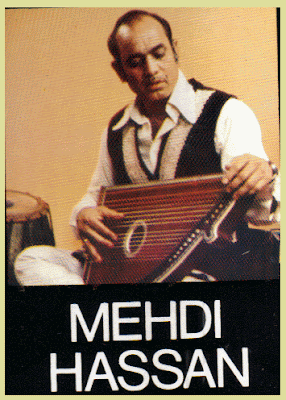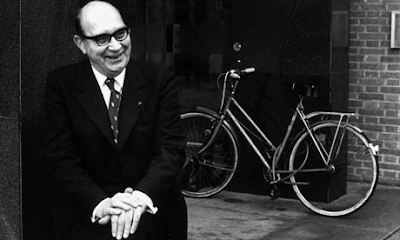 Writing about some of the cultural influences of my childhood and adolescence was one of the reasons I started writing this blog a couple of years ago. In part, it is an exercise in nostalgia but it is also a desire to share the treasures that I feel I was unusually fortunate to be exposed to from an early age.
Writing about some of the cultural influences of my childhood and adolescence was one of the reasons I started writing this blog a couple of years ago. In part, it is an exercise in nostalgia but it is also a desire to share the treasures that I feel I was unusually fortunate to be exposed to from an early age.One such indelible influence has been the sublime singing of Mehdi Hassan. I have long wanted to write something about his life and craft but have not found myself equal to the task. A performer of his caliber, I have long believed, needs an in-depth and first rate evaluation. Sadly, to my knowledge, no such effort has emerged, at least in English or on the internet. Finally, a recent conversation with Adil Najam has prompted me to at least share some of my favorite Mehdi Hassan pieces in this post. These can at least be my humble personal tribute to one of the greatest sub-continental singers of the post-partition era.
It is deeply sad that even though his music still has many passionate devotees only the bare bones of Mehdi Hassan's biography are documented. The most comprehensive facts on the internet have been collected by Mr. Anis Shakur whose biographical sketches (even if somewhat unsystematic) of many Pakistani artists and musicians are an invaluable contribution for the preservation of Pakistani cultural memory.
Mehdi Hassan was born in 1927 in the town of Luna, district Jhunjhunu in Rajasthan. Luna is about 100 miles from Jaipur. He was born in a family of musicians and his father Ustad Azeem Khan and uncle ('chacha') Ustad Ismail Khan were notable classical singers of their time. Mehdi Hassan started learning at a very young age from his father. It is said that his first public performance was at age eight at the palace of Maharaja of Baroda. Mehdi Hassan moved to District Khushab in the Sargodha region in Pakistan after partition and worked as an automobile mechanic for some time. Eventually, to pursue his life's calling and seeking a career in music he moved to Karachi. Here he debuted from Radio Pakistan in 1952 singing one of his best known ghazals (by Faiz Ahmed Faiz), "GuloN meiN rang bhare baad-e-nau bahar chale". The composition is by Pandit Ghulam Qadir, who was Mehdi Hassan's older brother and an exceptionally talented composer. I have not been able to find even rudimentary information on Ghulam Qadir other than Mehdi Hassan's statement in a TV program that his older brother was also the composer of two other masterpieces; Hafeez Hoshiarpuri's ghazal "Mohabbat karne waale kum na hoNge" and Razi Tirmizi's "Bhooli bisri chand umeedeiN".
Update: September 20th, 2012
I found a great detailed PTV interview with Mehdi Hassan from the 1980's on YouTube the other day. The interviewer is the well-known compere Yasmin Tahir. In this interview Mehdi Hassan provides a lot of rich biographical detail about his life including the fact that he was likely born in 1934/35 not 1927 as is commonly reported. I am including this interview here:
And now for my selection of five personal favorites. For the embedded videos below, with one exception, I have tried to choose some of the lesser known gems in the Mehdi Hassan oeuvre. The last video is the only non-ghazal piece I have included. That semi-classical composition in Raga Tilak Kamod demonstrates Khan Sahib's virtuosic brilliance like few other performances. The effortless beauty of the vocals are mesmerizing and for those who enjoy Hindustani classical music this is the piece de resistance of my selection.
First off the most well known of my selections is Ahmed Faraz's "Ranjish hi sahi":
Ik umr se hooN lazzat-e-girya se bhi mehroom
Aye rahat-e-jaaN mujh ko rulane ke liye aa
Next is Aziz Hamid Madani's ghazal "Taaza hawa bahaar ki":
Taaza hawa bahaar ki dil ka malaal lay gayee
Paa-e-junooN se halka-e-gardish-e-haal le gayee
A ghazal by Hakeem Momin Khan Momin, "Navak andaaz jidhar deeda-e-janaaN"
Phir bahaar aayee wohi dasht nawardi hogee
Phir wohi paaoN wohi khaar-e-mugheelaN hoNge
Khan Sahib's divine singing of Razi Tirmizi's ghazal "Bhooli bisri chand umeedeiN" mentioned above:
Bhooli bisri chand umeedeiN chand fasanay yaad aaye
Tum yaad aaye aur tumhare saath zamaane yaad aaye
and finally the marvelously executed semi-classical number, "Dukhwa meiN kaase kahooN moray sajni" in Raga Tilak Kamod:

